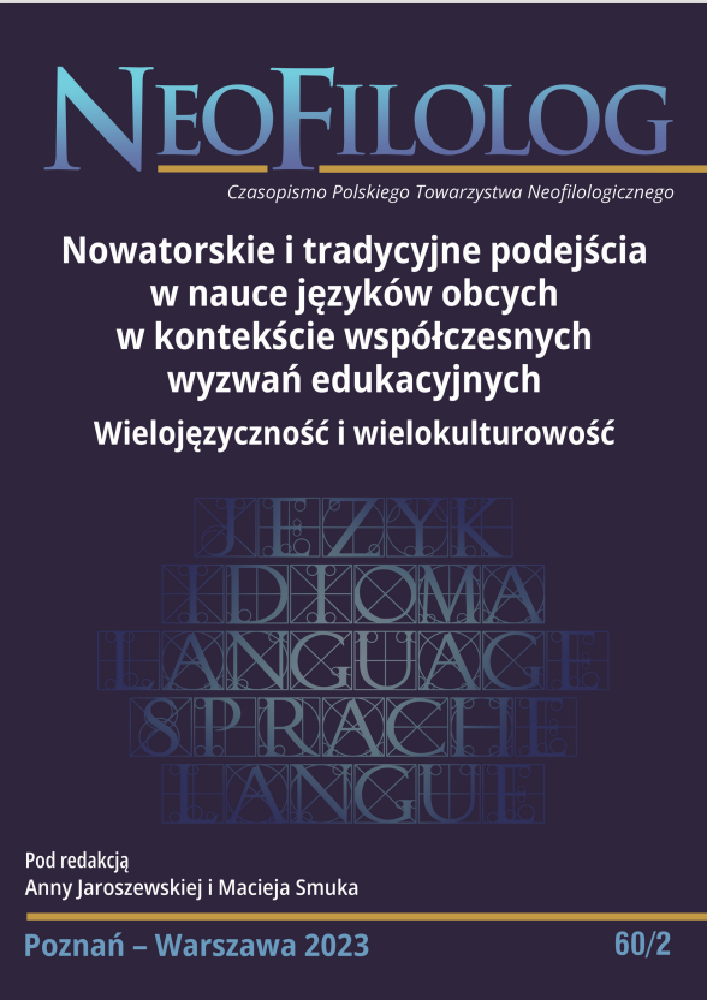Abstrakt
As a result of increasing numbers of immigrants, Poland is currently in the process of transition from a predominantly mono-lingual/cultural to multilingual/cultural country. Consequently, a constantly rising number of foreign students is joining Polish schools, who face the need to adapt to new social and institutional settings. In response to this demographic trend, the main aim of this paper is to point to the role of different factors recognised as facilitating in the process of school adaptation in the case of immigrant students in the Polish educational system. The research participants, 23 Polish teachers of English, in semi-structured interviews, described over 60 cases of multilingual children they used to work with. Out of these, the accounts describing primary school learners who had adapted well to new educational environments were selected for qualitative analysis, conducted with the aid of NVivo Software. In this case study, the stories of four successful adaptations have been selected to illustrate the importance of factors recognised in the analysis as those which favourably assist the process of school adjustment. These include: (1) the individual dispositions of the newcomer, (2) the behaviours of their classmates, (3) the supportive actions of teachers, (4) parents’ engagement and assistance.
Bibliografia
Alisaari, J., Heikkola, L. M., Commins, N., & Acquah, E. O. (2018), Monolingual ideologies confronting multilingual realities. Finnish teachers’ beliefs about linguistic diversity. „Teaching and Teacher Education”, 80, 48–58. DOI: https://doi.org/10.1016/j.tate.2019.01.003
Banasiak, I., Olpińska-Szkiełko, M. (2020), Sociolinguistic determinants of heritage language maintenance and second language acquisition in bilingual immigrant speakers. „Glottodidactica”, XLVII(2), 49–65. DOI: https://doi.org/10.14746/gl.2020.47.2.01
Brizuela, B. M., & Garcia-Sellers, M. J. (1998), School adaptation: A triangular process. „American Educational Research Journal”, 36(2), 345–370. DOI: https://doi.org/10.3102/00028312036002345
Cillessen A. H. N. & Mayeux L. (2004), Sociometric status and peer group behavior: previous findings and current directions, (In:) J. B. Kupersmidt & K. A. Dodge (Eds.), Children’s peer relations: From development to intervention. American Psychological Association, 3–22. DOI: https://doi.org/10.1037/10653-001
Creswell, J. W. (2007), Qualitative Inquiry and Research Design: Choosing Among Five Approaches. SAGE Publications, Inc.
European Parliament. (2021), Retrieved January 20, 2022, from https://www.europarl.europa.eu/portal/en.
Hopp, H., Jakisch, J., Sturm, S., Becker, C., Thoma, D. (2019), Integrating multilingualism into the early foreign language classroom: Empirical and teaching perspectives. „International Multilingual Research Journal”, 14:2, 146–162. DOI: https://doi.org/10.1080/19313152.2019.1669519
Gawlicz, K., Rudnicki, P., Starnawski, M. (2015), Dyskryminacja w edukacji – przegląd wybranych polskich badań [Discrimination in education – an overview of selected Polish studies], (In:) Gawlicz, K., Rudnicki, P., Starnawski, M. (Eds.), Dyskryminacja w szkole – obecność nieusprawiedliwiona. O budowaniu edukacji antydyskryminacyjnej w systemie edukacji formalnej w Polsce. Raport z badań [Discrimination at school – presence unjustified. On building anti-discrimination education in the formal education system in Poland. Research report]. Warsaw: Towarzystwo Edukacji Antydyskryminacyjne, 9–58.
Główny Urząd Statystyczny [Central Statistical Office]. (2021), Retrieved May 7, 2022, from https://stat.gov.pl/.
Guralnick M. J. (1999), Family and child influences on the peer-related social competence of young children with developmental delays. „Mental Retardation and Developmental Disabilities Research Reviews”, 5, 21–9. DOI: https://doi.org/10.1002/(SICI)1098-2779(1999)5:1<21::AID-MRDD3>3.0.CO;2-O
Grzymała-Moszczyńska, H., Grzymała-Moszczyńska, J., Durlik-Marcinowska, J., & Szydłowska-Klakla, P. (2015), (Nie)łatwe powroty do domu?: funkcjonowanie dzieci i młodzieży powracających z emigracji [(Not) easy return home?: the functioning of children and young returning from exile]. Fundacja Centrum im. prof. Bronisława Geremka.
Jankowska, E. (2021), Znam dziecko cudzoziemskie, które w wieku 12 lat osiwiało ze stresu [I know a foreign child who turned grey because of stress at the age of 12]. weekend.gazeta.pl Retrieved January 20, 2022, from https://weekend.gazeta.pl/weekend/7,177333,27814053,znam-dziecko-cudzoziemskie-ktore-w-wieku-12-lat-osiwialo-ze.html.
Kalwasiński, M. (2021), Polacy wracają z emigracji [Poles are returning from immigration]. Bankier.pl. Retrieved November 23, 2022, from https://www.bankier.pl/wiadomosc/Polacy-wracaja-z-emigracji-8211632.html.
Krippendorff, K. (2003), Content analysis. An introduction to its methodology. SAGE Publications.
McIntyre, L. L., Blacher, J., & Baker, B. L. (2006), The transition to school: adaptation in young children with and without intellectual disability. „Journal of Intellectual Disability Research”, 50(5), 349–361. DOI: https://doi.org/10.1111/j.1365-2788.2006.00783.x
Medvedeva, M., & Portes, A. (2017), Immigrant Bilingualism in Spain: An Asset or a Liability? „International Migration Review”, 51(3), 632–666. DOI: https://doi.org/10.1111/imre.12243
Medvedeva, M. (2018), Immigrants’ Linguistic Adaptation, (In:) R.J.R. Levesque (Ed.) Encyclopedia of Adolescence. Springer. DOI: https://doi.org/10.1007/978-3-319-33228-4_208
Migration. (2019). The United Nations. Retrieved August 22, 2022, from https://www.un.org/en/global-issues/migration/.
Ministerstwo Edukacji i Nauki [Ministry of Education and Science]. (2021), Retrieved March 6, 2022, from https://www.gov.pl/web/edukacja-i-nauka.
Oleksa, K. (2016), Trudności z adaptacją szkolną uczniów [Students’ adaptation problems]. „Życie Szkoły” [School life], 19, 18.Pianta, R. C., Steinberg, M. S., & Rollins, K. B. (1995), The first two years of school: Teacher-child relationships and deflections in children’s classroom adjustment. „Development and Psychopathology”, 7(2), 295–312. DOI: https://doi.org/10.1017/S0954579400006519
Perry, K. E., & Weinstein, R. S. (1997), The social context of early schooling and children’s school adjustment. „Educational Psychologist”, 33(4), 177–194. DOI: https://doi.org/10.1207/s15326985ep3304_3
Rokita-Jaśkow, J., Wolanin, A., Król-Gierat, W., & Nosidlak, K. (2022), Bridging the ‘dual lives’: school socialization of young bi/multilinguals in the eyes of EFL teachers. „International Journal of Bilingual Education and Bilingualism”, 1–16. DOI: https://doi.org/10.1080/13670050.2022.2114788
Saldana, J. (2009), The coding manual for qualitative researchers. Sage.
Urząd Do Spraw Cudzoziemców [Office for Foreigners] (2021), Retrieved May 7, 2022, from https://www.gov.pl/web/udsc/urzad-do-spraw-cudzoziemcow.
Zhang, D., Cui, Y., Zhou, Y., Cai, M., & Liu, H. (2018), The Role of School Adaptation and Self-Concept in Influencing Chinese High School Students’ Growth in Math Achievement. „Frontiers in Psychology“, 9. DOI: https://doi.org/10.3389/fpsyg.2018.02356
Licencja
Prawa autorskie (c) 2023 Katarzyna Nosidlak

Utwór dostępny jest na licencji Creative Commons Uznanie autorstwa – Bez utworów zależnych 4.0 Międzynarodowe.
Przedstawiany utwór (artykuł) upubliczniany jest na podstawie umowy z autorem i na licencji Creative Commons Attribution-NoDerivatives 4.0 International (CC BY-ND 4.0).
Użytkownicy mają obowiązek podania wraz z rozpowszechnionym utworem, informacji o autorstwie, tytule, źródle (odnośniki do oryginalnego utworu, DOI) oraz samej licencji;
- bez tworzenia utworów zależnych,
- utwór musi być zachowany w oryginalnej postaci.
Uniwersytet im. Adama Mickiewicza w Poznaniu zachowuje prawo do czasopisma jako całości (układ, forma graficzna, tytuł, projekt okładki, logo itp.).

